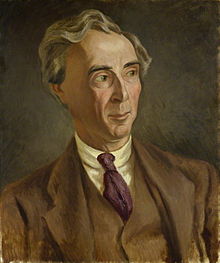
Russell was born in Ravenscroft, the home of his parents, Lord & Lady Amberley. His grandfather, Lord John Russell, was the youngest son of Bedford's 6th Duke. In 1861, after a long and prestigious political career, in which he served twice as Prime Minister, Lord Russell ennobled by Queen Victoria, became 1st Earl Russell. In 1931 Bertrand Russell became the third Earl Russell, after his elder brother Frank, the homeless died.
Russell's early life was struck by tragedy and grief. By the time she was six years old, her sister, Rachel, her parents and her grandfather had died, and she and Frank were left in the care of their grandmother, County Russell. Although Frank was sent to Winchester School, Bertrand was privately educated at home, and his childhood was later spent in separation from other children for his great regret.Intellectually unstable, he was absorbed in mathematics from early age and at the age of 11 he experienced the experience of Euclidean geometry as "first glittering in love", because it made him addictive, demonic knowledge Presented with the possibility.
Bertrand Arthur William Russell, Third Earl Russell, OM FRS was a British philosopher, logician, mathematician, historian, writer, social critic, political activist and Nobel laureate. At different points of his life, Russell considered himself moderate, a socialist and a pacifist, but he also admitted that he had never done any of these things in depth. Russell was born in Monmouthshire, one of the most prominent noble families of the United Kingdom.

In the beginning of the 20th century, Russell led the British to "revolt against idealism". He is considered to be one of the founders of Analyst Darshan, with his predecessor Gotlab Frage, associate Ge Moore and Protoz Ludwig Wittstein. It is widely organized to be one of the major logicians of the 20th century.
He wrote Principia Mathematica with AN Whitehead, an attempt to create a logical basis for mathematics. His philosophical essay "On denoting" is considered "the philosophy of philosophy". His work has had a great impact on the philosophy of mathematics, logic, set theory, linguistics, artificial intelligence, cognitive science, computer science (see type theory and type system) and philosophy, especially language, continent and spirituality.
In December 1894, he married Miss Ellis Pierce Smith. After spending some months in Berlin studying social democracy, he went to live near Hasselmere, where he devoted his time in the study of philosophy. In 1900 he Visited the Mathematical Congress in Paris. He was influenced by the ability of Italian mathematician Peño and his students, and immediately studied the works of Pino. In 1903, he wrote his first important book, The Principles of Mathematics, and his friend, Dr. Alfred Whitehead, developed and expanded the mathematical logic of Pino and Freeze.

From time to time, they left philosophy for politics. In 1910 he was appointed a lecturer at Trinity College. After the breakdown of the First World War, he played an active role in the No-Confiscation Fellowship, and a £ 100 fine was imposed as the author of a book criticizing the two-year sentence on an honest objector.His college deprived him of his lecture in 1916. He was offered a post at Harvard University, but he was denied a passport. He wanted to give a lecture course (later published as political ideals in the United States, 1918) but the military authorities stopped it.


0 Comments